#StandWithHongKong #NationalSecurityLaw
On a January day in 1841, as Lieutenant William Hall guided the East India Company’s first British ocean-going iron warship, Nemesis, towards the Bocca Tigris on the Pearl River Delta, little did he know what his next actions would mean for the future. Admiral Guan Tianpei led the Chinese fleet against the British steamer Nemesis, to the Admiral’s disappointment the naval battle was over in one and half hours with 11 Chinese junks destroyed and a handful of wounded on the British ships. Lord Palmerston, soon after China’s fleet was defeated, described the newly won territory of Hong Kong as “a barren island with hardly a house upon it”. Looking back at the inception of this global financial trade hub, both of these distinguished gentlemen would be extremely pleased with how Hong Kong has fared economically.
In 1845 the banking industry began in Hong Kong with the opening of a branch of the Oriental Banking Corporation, which has now been replaced by big household names like HSBC (established in 1865) and Standard Chartered Hong Kong (established in 1859) as the earliest large banking players to have survived so long on the island.
Things changed dramatically for the island when in December 1984, the Sino-British Joint Declaration was agreed between the British and Chinese Governments where Hong Kong would be ceded back to China from July 1997 and would be allowed to have a “high degree of autonomy” for 50 years through the “One country, Two systems” principle. Margaret Thatcher had a lot of involvement in agreeing these conditions and the signing of the agreement was a long and drawn out affair with Annexes added in 1988 and amendments added even up to and including 2000.
China has become heavily involved with the development of Hong Kong since 1997 through opening up the Hong Kong Stock Exchange to everyday Chinese citizens. There are many differences between how the US and Chinese Stock Exchanges work, and with the growth of the middle class in China there are many signs to show that the Chinese Exchanges have a lot of space to develop compared to their US counterparts.
For some time now Hong Kong has been in the Top 5 Stock Exchanges in the World as well – with only the NYSE, NASDAQ and Shanghai Stock Exchanges ahead of Hong Kong by Market Capitalization, with the Shenzhen Stock Exchange not far behind, something #DisruptionBanking covered a few weeks ago. In fact, it wasn’t so long ago in 2019 when the Hong Kong Stock Exchange’s bid of $36.6 billion to buy the London Stock Exchange raised eyebrows across global capital markets. The deal didn’t go through, but it was enough to show the ambitions behind the current Executive in place in Hong Kong.
Things were looking pretty good for Hong Kong during the subsequent decades of living hand-in-hand with China. The amount of IPOs raising billions over the years, in particular, has played a significant part of why Hong Kong is such a huge financial hub. Just last November, Ali Baba celebrated its’ 20th Birthday by raising $12.9 billion on the Hong Kong Stock Exchange for example.
Highlights from Alibaba's listing on the Hong Kong exchange: pic.twitter.com/0VuPp6gfAX
— Alibaba Group (@AlibabaGroup) November 26, 2019
And Ali Baba is not the only corporation who have raised substantial sums of investments on the Hong Kong Stock Exchange, with Hong Kong being the leader of IPOs globally for a long time now, at least by number of IPOs.
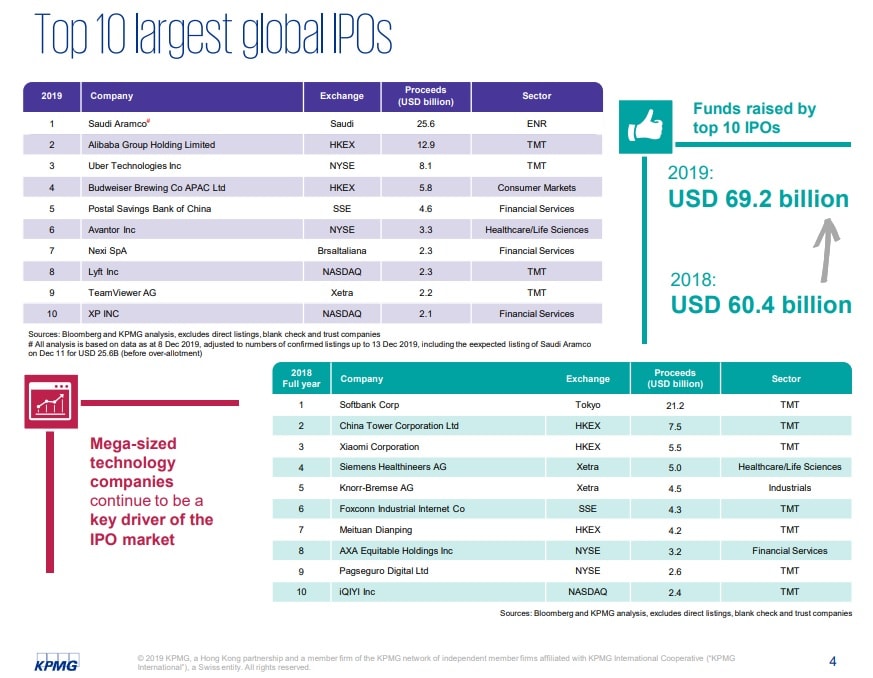
Of course, Hong Kong has had a few rogue traders over the years with Nomura and RBS both having experienced some losses because of this, however none of these traders were of the level of those of Jerome Kerviel for instance. With the Hong Kong Stock Exchange competing with the Nasdaq, Shanghai and Singapore Stock Exchanges, the Hong Kong Stock Exchange has traditionally argued that it has better corporate governance than others, the question is how long will this be the case? Hong Kong will be enticing Chinese investors to invest in global stocks through Hong Kong but there is no guarantee that Western corporations will be able to operate normally on the island following the escalation of matters over the last few days. Sounds like Disruption…
Charles Li, the CEO of the Hong Kong Stock Exchange remains positive about the outlook. He knows that his Exchange needs to have more exposure to markets outside of China, but he is determined in his drive to continue to improve the reputation of his Exchange globally. Perhaps the Hong Kong Stock Exchange has not done as well as the FTSE, Dow Jones or NYSE in the last 5 years, but it can be argued, much as is the case with Shenzhen, that equities listed on the Hong Kong Exchange have a lot of growth potential compared to equities listed on other platforms across the world. Especially in the post-COVID world of low interest rates and potential negative government bonds in the West.
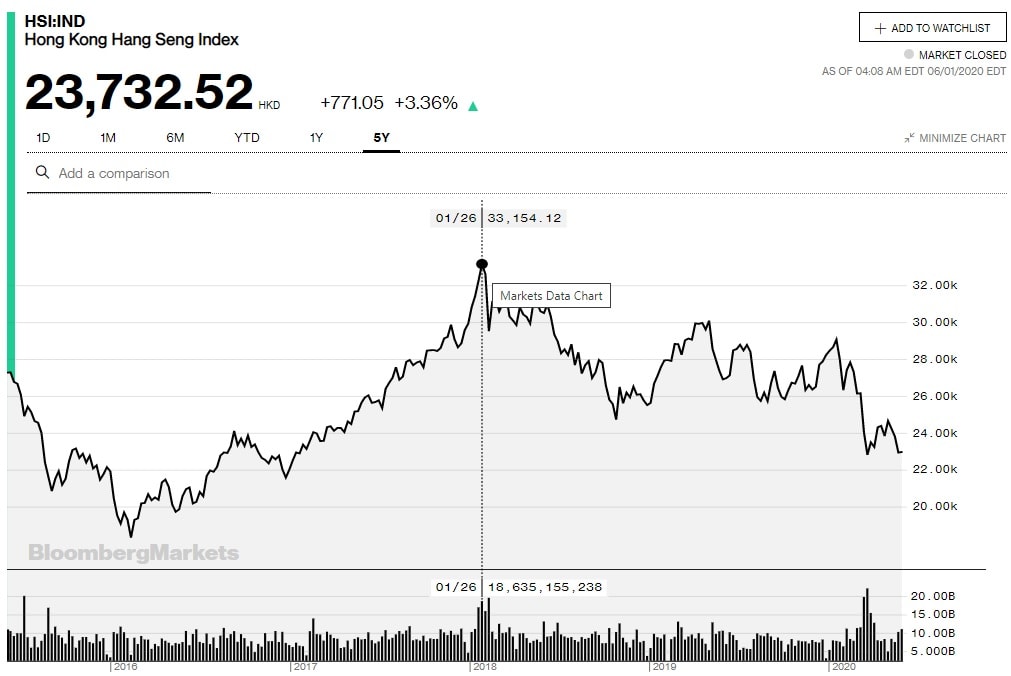
To highlight the strength of the IPO market, EY published a detailed report in 2020 to cover the significance of the Asia-Pacific Stock Exchanges. It all looked so rosy back in early January when EY’s Global IPO Leader Paul Go shared in a report that: “As we head into 2020, we anticipate that some of the geopolitical uncertainties and trade tensions that plagued the IPO market in 2019 will fade.”
Improving outlook could increase number of IPOs in 2020, EY says https://t.co/4eRUzOfJUN
— Paul Go (@EYPaulGo) December 17, 2019
However, just as Mike Pompeo was warming up to prepare his next Tweet about the situation regarding the #NationalSecurityLaw, Tencent (the owners of China’s FaceBook – WeChat) was in the process of raising $6 billion on the Hong Kong Stock Exchange
Tencent raises $6 billion in the largest debt deal by an Asian corporate in 2020 https://t.co/TXHlBudGOw pic.twitter.com/n3EY67LxGP
— Reuters Business (@ReutersBiz) May 28, 2020
Even yesterday, HSBC were busy helping Yeahka Technology, incorporated in the Cayman Islands, awarded in China as ‘Financial Technology Company of the Year’ to raise over $200 million during their listing on the Hong Kong Stock Exchange . According to Oliver Wyman, Yeahka are the second largest non-bank independent QR Code payment service provider in China in terms of average daily transaction count in 2019.

HSBC are not the only international bank involved in the IPO market, they are one of many in the market with Credit Suisse, Citigroup, JPMorgan and Morgan Stanley all involved in the Ali Baba listing in late 2019.
Citigroup joined JPMorgan in helping WeDoctor raise $1 billion with their IPO back in April 2020. Credit Suisse and Morgan Stanley also worked with Luckin Coffee back in May 2019 with raising $645 million during their IPO
Citi replaces Credit Suisse in WeDoctor's $1 billion Hong Kong IPO: sources https://t.co/FynW1AglG7 pic.twitter.com/Zj15H43goK
— Reuters (@Reuters) April 8, 2020
Recently JPMorgan supported JD.com (China’s Amazon) to raise funds with their IPO
While US gov is working on responses to #NationalSecurityLaw , JPMorgan is helping #CCP own companies to be listed in Hong Kong Stock market.Does White House know that this can let CHINA gain a strong financial backup&ignore anything you’re going to dohttps://t.co/9BQMODkSXI
— Desmond Leung 😷 (@dez1o1) May 29, 2020
In fact the Hong Kong Stock Exchange encourages a lot of interest amongst the main US Banks with Goldman Sachs, JPMorgan, Citi and Morgan Stanley involved in IPOs in the past:
Of Alibaba's six main IPO banks, Credit Suisse, Goldman, JPMorgan and Morgan Stanley have all since worked on Tencent listings. Citi helped Naspers sell $10bn of Tencent stock and Deutsche raised money for WeDoctor. So who's left? https://t.co/W4RJlZMAlj
— Steve Garton (@SteveGartonHK) June 5, 2018
Other Tech leaders like Jimmy Lai have not just appealed to the US with regards to help with IPOs but also by appealing to the US for support #StandWithHongKong
#CNN interview with @JimmyLaiApple appealing to @realDonaldTrump to #StandwithHonKong https://t.co/eZj0MFjLUz
— anna coren (@amcoren) May 26, 2020
However, let’s not get carried away because the last few days have revealed some important stories during further unrest in Hong Kong. Two themes have particularly stood out, the two voices of China and the USA when it comes to Hong Kong, or in this case the voices of Leung Chun-ying and Mike Pompeo.
Today, I reported to Congress that Hong Kong is no longer autonomous from China, given facts on the ground. The United States stands with the people of Hong Kong.
— Secretary Pompeo (@SecPompeo) May 27, 2020
Hong Kong’s former leader lashes out at HSBC over not publicly voicing support for China’s national security laws https://t.co/n0yLtLXkWx
— Bloomberg (@business) May 29, 2020
It almost looks like a retaliatory Facebook Post to Mike Pompeo’s Tweet, but things are escalating, let’s not fool ourselves, and they are escalating with HSBC dropped straight in the middle of things.
There are still some good things to consider. For instance, HSBC keep winning the Best Broker in Hong Kong Award, HSBC Broking Services Limited is listed as Best Overall Hong Kong Stockbroker.
How did HSBC get burdened with all the expectations that China might have towards the Western banking giants in Hong Kong though? Leung Chun-ying doesn’t seem to want to comment on any banks apart from HSBC in his recent post on Facebook, and there are many ways to interpret this personal scalding of Europe’s largest Bank.
In fact since a substantial bear run on the Hong Kong Stock Exchange back in 2016, Wall Street and European Banks have been piling into Hong Kong to manoeuvre their sights towards mainland China. Current political tensions may lead to many of the leading traders reconsidering their desire to stay working in the financial hub, especially with Britain offering a way out to many of them.
Brain drain from Hong Kong feared.https://t.co/q8lbNR7xi7
— Nikkei Asia (@NikkeiAsia) May 29, 2020
And although HSBC has been “exposed” alongside Standard Chartered and Prudential to a lesser extent as being in the middle of a US vs China battleground in China . There are many reasons to remain positive about impending Sanctions on China that Trump’s rhetoric is currently threatening. Trump might be threatening to cut Chinese trade off completely, and even go so far as to rescind Visas given to Chinese students currently studying in US universities, but he won’t have an answer for replacing GM’s Number 1 market globally (China is a bigger market for GM cars than the US) or for replacing Apple’s Number 2 market globally (China is the 2nd market for Apple after the US). Not to mention the Belt & Road Initiative members who will be unlikely to support Sanctions on China…
But more about that in Part 2 of our China Special which will be out this coming Thursday.
Author: Andy Samu
Back in September 2019 the #DisruptionBanking team already covered the early stages of the #StandWithHongKong protests, focusing on the Fintech scene as well as details of Hong Kong’s role as a Gateway to Investment in and out of Mainland China




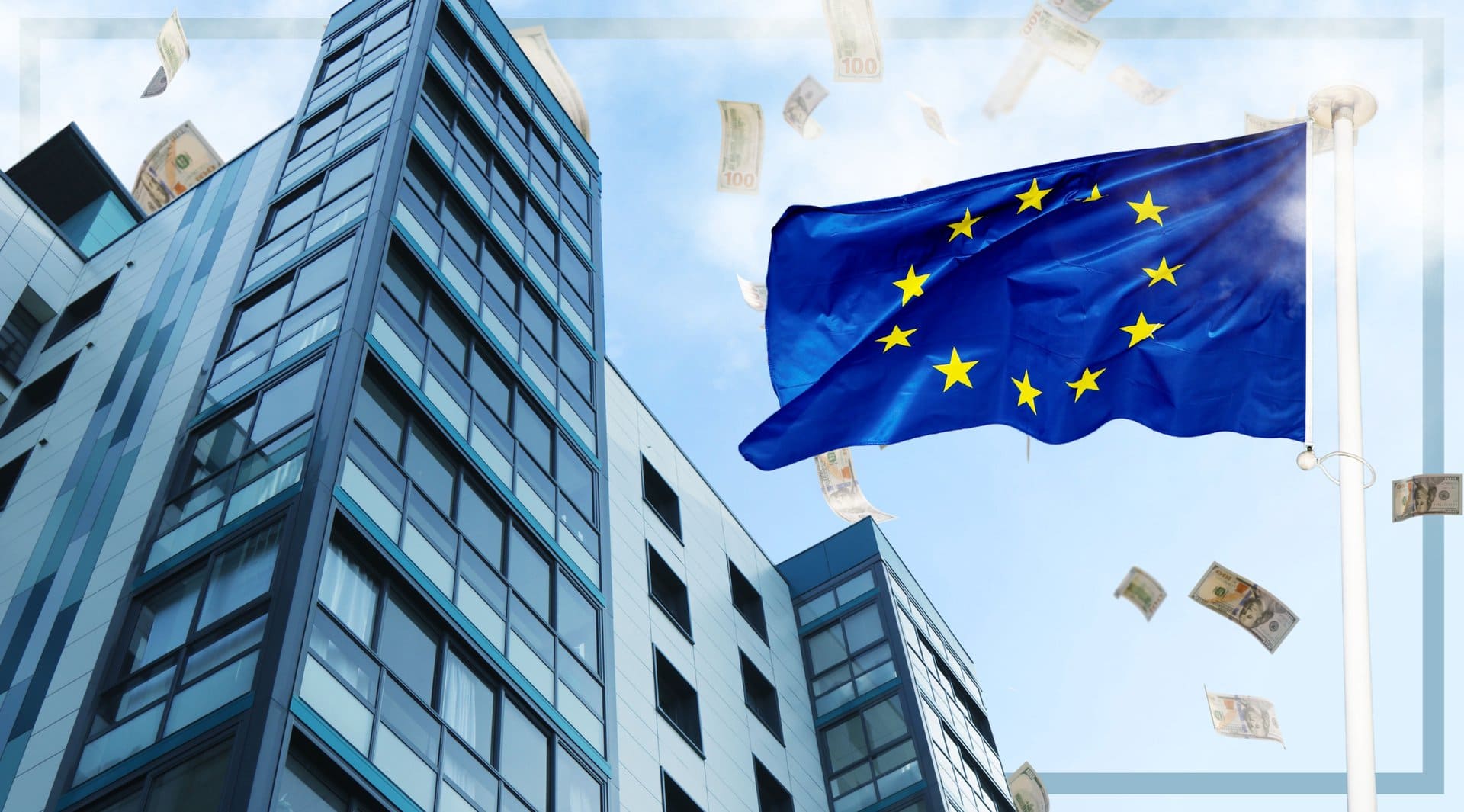







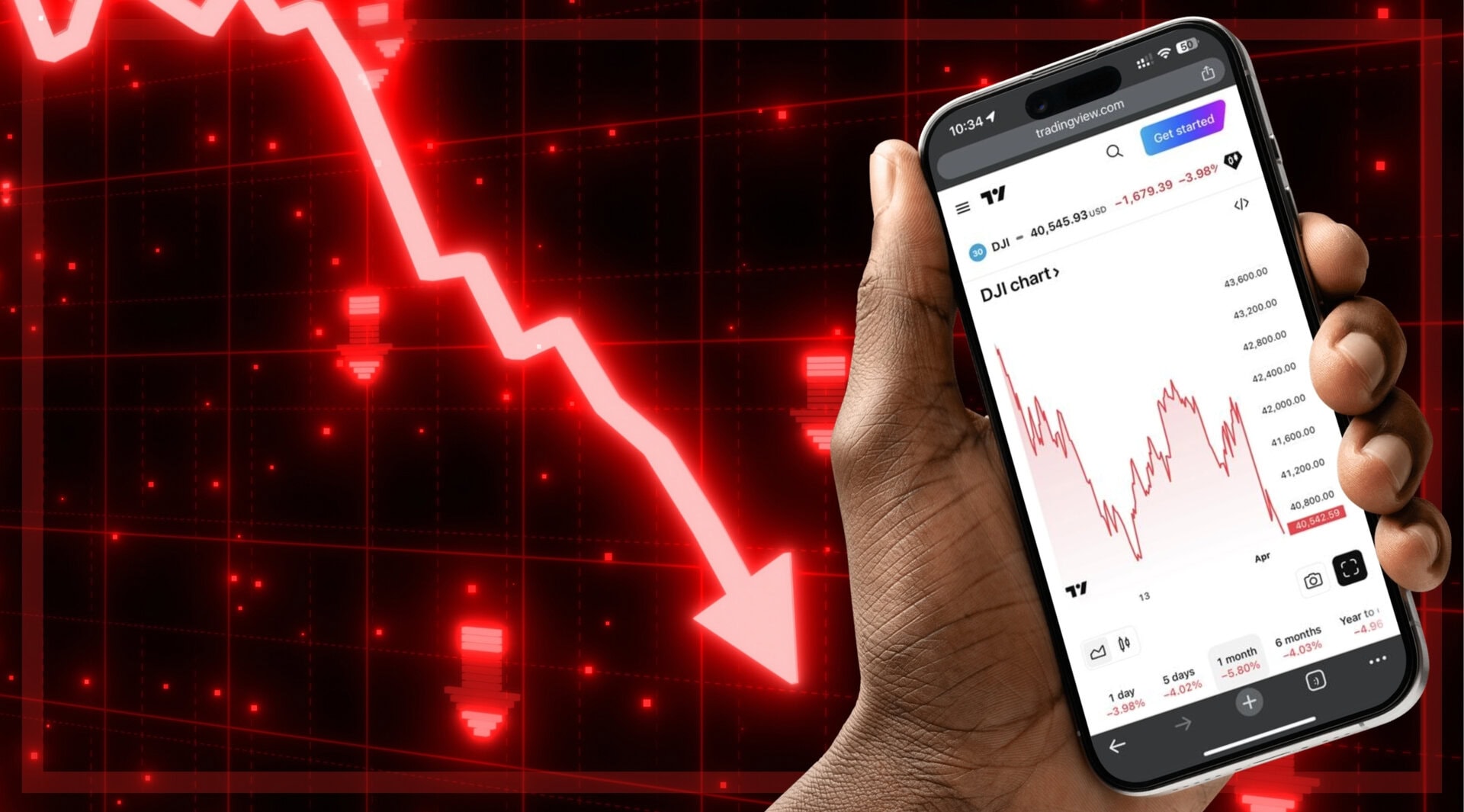

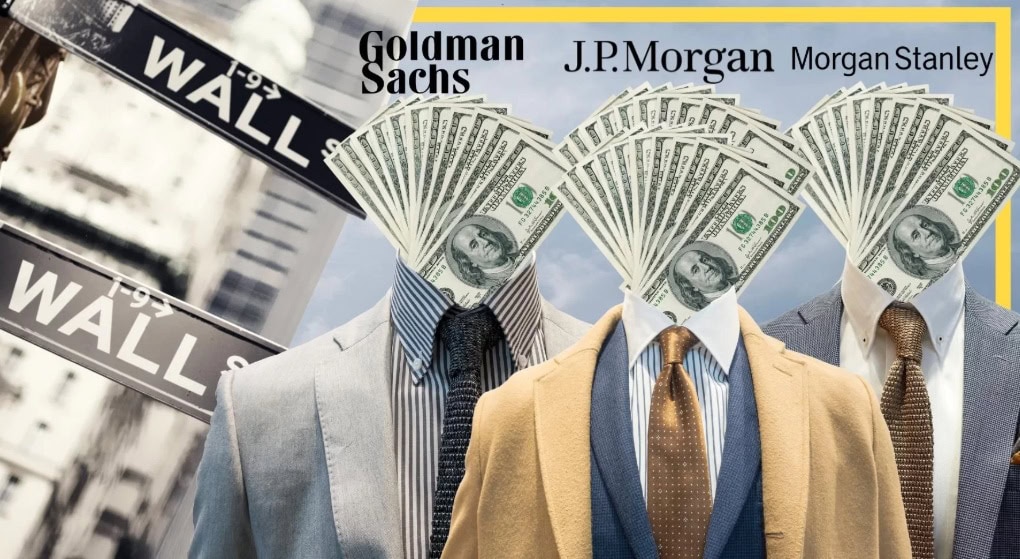

2 Responses